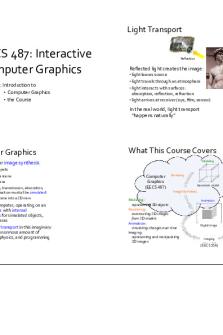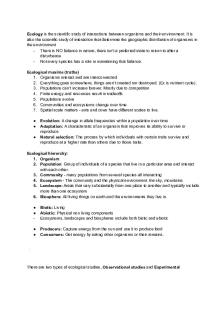01-CS 5780 - Lecture 1 PDF

| Title | 01-CS 5780 - Lecture 1 |
|---|---|
| Author | amit mishra |
| Course | Advanced Machine Learning |
| Institution | Cornell University |
| Pages | 11 |
| File Size | 210.6 KB |
| File Type | |
| Total Downloads | 27 |
| Total Views | 149 |
Summary
Lecture 1...
Description
CS4780/5780 - Machine Learning Fall 2013 Thorsten Joachims Cornell University Department of Computer Science
Outline of Today Who we are? Prof: Thorsten Joachims TAs: Igor Labutov, Ian Lenz, Karthik Raman, Tobias Schnabel, Emma Kilfoyle Consultants: Darren Voon, Ben Shulman, Wenhai Yang, Anthony Fu, Brook Du, Detian Shi, Steve Mandl
What is learning? Why should a computer be able to learn? Examples of machine learning (ML). What drives research in and use of ML today?
Syllabus Administrivia
(One) Definition of Learning Definition [Mitchell]: A computer program is said to learn from experience E with respect to some class of tasks T and performance measure P,
if its performance at tasks in T, as measured by P, improves with experience E.
Syllabus Instance-Based Learning : k-nearest neighbor, collaborative filtering Decision Trees : TDIDT, attribute selection, pruning and overfitting Linear Rules : Perceptron, logistic regression, linear regression, duality Support Vector Machines : optimal hyperplane, margin, kernels, stability Generative Models : naïve Bayes, linear discriminant analysis Hidden Markov Models : probabilistic model, estimation, Viterbi Structured Output Prediction : predicting sequences, rankings, etc. Statistical Learning Theory : PAC learning, VC dimension, error bounds Online Learning : experts, bandits, online mistake bounds Clustering : HAC Clustering, k-means, mixture of Gaussians Recommendation: similarity-based methods, matrix factorization, etc. ML Experimentation: hypothesis tests, cross validation, resampling
Textbook and Course Material Main Textbooks Tom Mitchell, "Machine Learning", McGraw Hill, 1997. CS4780 Course Pack from Campus Store
Additional References (optional) a Probabilistic See other references on course web page
Course Notes Writing on blackboard Slides available on course homepage Video of lecture available on course homepage
Pre-Requisites and Related Courses Pre-Requisites Programming skills (e.g. CS 2110) Basic linear algebra (e.g. MATH 2940) Basic probability theory (e.g. CS 2800) Short exam to test prereqs (via CMS)
Related Courses CS4700: Foundations of Artificial Intelligence CS4758: Robot Learning CS4300: Information Retrieval CS4740: Natural Language Processing CS6780: Advanced Machine Learning CS6784: Advanced Topics in Machine Learning CS6740: Advanced Language Technologies CS6782: Probabilistic Graphical Models
Homework Assignments Assignments 5 homework assignments Some problem sets, some programming and experiments
Policies Assignments are due at the beginning of class on the due date in hardcopy. Code must be submitted via CMS by the same deadline. Assignments turned in late will be charged a 1 percentage point reduction of the cumulated final homework grade for each period of 24 hours for which the assignment is late. Everybody has No assignments will be accepted after the solutions have been made available (typically 3-5 days after deadline). Typically collaboration of two students (see each assignment for detailed collaboration policy). We run automatic cheating detection. Must state all sources of material used in assignments or project. Please review Cornell Academic Integrity Policy!
Exams and Quizzes In-class Quizzes A few per semester No longer than 5 minutes
Exams Two Prelim exams October 17 (week of fall break) November 26 (week of thanksgiving break)
In class No final exam
Final Project Organization Self-defined topic related to your interests and research Groups of 3-4 students Each group has TA as advisor
Deliverables Project proposal (week after fall break) Meetings with TA to discuss progress Poster presentation (last week of classes) Project report (December 11) Peer review (December 18)
Grading Deliverables 2 Prelim Exams Final Project Homeworks (~5 assignments) Quizzes (in class) PreReq Exam Participation
(50% of Grade) (15% of Grade) (25% of Grade) (5% of Grade) (2% of Grade) (3% of Grade)
Outlier elimination For homeworks and quizzes, the lowest grade is replaced by the second lowest grade.
How to Get in Touch Online Course Homepage (slides, video, references, policies, office hours) http://machine-learning-course.joachims.org/
Piazza forum (questions and comments) CMS (homeworks and grades) Email Addresses Thorsten Joachims: [email protected] Igor Labutov: [email protected] [homework and solutions] Karthik Raman: [email protected] [projects] Tobias Schnabel: [email protected] [office hours, piazza, video] Ian Lenz: [email protected] [late submissions, CMS, regrades] Office Hours Thorsten Joachims: Thursdays 2:40pm 4:00pm, 4153 Upson Hall
Other office hours: See course homepage...
Similar Free PDFs

01-CS 5780 - Lecture 1
- 11 Pages

Lecture-1 - Lecture notes 1
- 6 Pages

Lecture notes, lecture 1
- 9 Pages

Lecture notes, lecture 1
- 4 Pages

Lecture-1-notes - lecture
- 1 Pages

Lecture notes- Lecture 1
- 20 Pages

Lecture notes, lecture 1
- 4 Pages

Lecture notes, lecture 1
- 9 Pages

Lecture 1
- 3 Pages

Lecture 1
- 30 Pages

Lecture 1
- 6 Pages

Lecture 1
- 9 Pages

Lecture 1
- 76 Pages

Lecture 1
- 5 Pages

Lecture 1
- 32 Pages
Popular Institutions
- Tinajero National High School - Annex
- Politeknik Caltex Riau
- Yokohama City University
- SGT University
- University of Al-Qadisiyah
- Divine Word College of Vigan
- Techniek College Rotterdam
- Universidade de Santiago
- Universiti Teknologi MARA Cawangan Johor Kampus Pasir Gudang
- Poltekkes Kemenkes Yogyakarta
- Baguio City National High School
- Colegio san marcos
- preparatoria uno
- Centro de Bachillerato Tecnológico Industrial y de Servicios No. 107
- Dalian Maritime University
- Quang Trung Secondary School
- Colegio Tecnológico en Informática
- Corporación Regional de Educación Superior
- Grupo CEDVA
- Dar Al Uloom University
- Centro de Estudios Preuniversitarios de la Universidad Nacional de Ingeniería
- 上智大学
- Aakash International School, Nuna Majara
- San Felipe Neri Catholic School
- Kang Chiao International School - New Taipei City
- Misamis Occidental National High School
- Institución Educativa Escuela Normal Juan Ladrilleros
- Kolehiyo ng Pantukan
- Batanes State College
- Instituto Continental
- Sekolah Menengah Kejuruan Kesehatan Kaltara (Tarakan)
- Colegio de La Inmaculada Concepcion - Cebu
